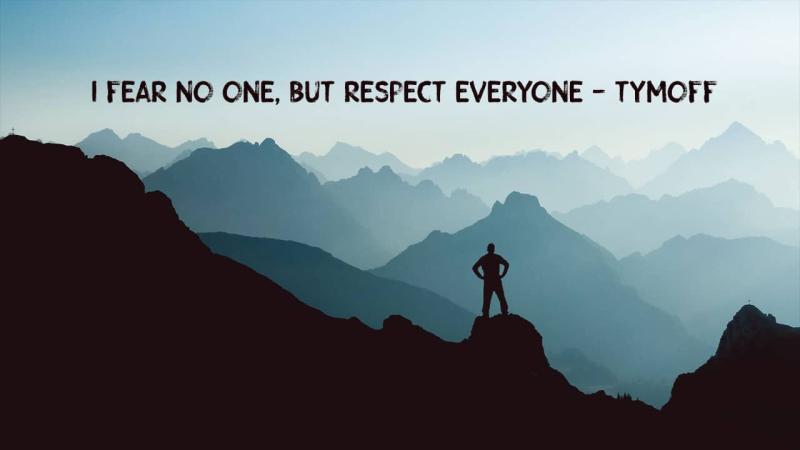Introduction
In a rapidly evolving professional landscape marked by uncertainty, competition, and complexity, the mindset you bring to the table can determine your success or failure. Among the most striking modern philosophies gaining momentum in leadership and self-development circles is the quote by Tymoff: “I fear no one, but respect everyone.”
This short statement holds profound truth. It speaks to a bold blend of courage and humility—two essential traits for thriving in today’s high-performance business environment. This blog explores the deeper meaning behind the quote, its relevance in business, and practical strategies to integrate this mindset into your professional life.
What Does “I Fear No One, But Respect Everyone” Really Mean?
At first glance, the quote may sound paradoxical. But it’s actually a balanced blueprint for leadership and personal excellence.
-
“I fear no one” represents courage, confidence, and inner strength—the belief in your abilities and the determination to act without being paralyzed by status, authority, or public opinion.
-
“But respect everyone” reminds us that true strength is paired with empathy, dignity, and professionalism. It’s a conscious choice to value others, regardless of power dynamics.
In essence, Tymoff’s quote defines a high-impact mindset: Be bold without being arrogant. Be respectful without being submissive.
Why This Mindset Matters More Than Ever in 2025
1. Confidence Is the New Currency
According to a 2024 Deloitte study, 83% of executives believe confident decision-making drives organizational growth. Fear can cause missed opportunities, delayed actions, and low morale. Adopting a fearless mindset empowers you to:
-
Speak with conviction
-
Navigate uncertainty with composure
-
Drive innovation, even under pressure
2. Respect Creates High-Performing Cultures
A 2023 Harvard Business Review article revealed that respect in the workplace is the #1 driver of employee engagement. Leaders who lead with respect:
-
Inspire loyalty
-
Increase productivity by 31%
-
Foster inclusive teams
3. Fearless Yet Respectful Leaders Drive Results
Research from Gallup shows that leaders who are both assertive and compassionate are 24% more likely to retain top talent and 35% more likely to exceed performance goals. Tymoff’s quote hits both marks—making it a game-changer in modern leadership.
Frequently Asked Questions (FAQs)
Q1: Isn’t fear necessary in business?
Fear can be a natural response—but letting it lead can sabotage results. Replace fear with strategic awareness and proactive planning. The goal is not recklessness, but calculated boldness.
Q2: Can respect coexist with fierce competition?
Absolutely. Respecting your competitors fosters healthy rivalry, encourages growth, and promotes fair play. Many of the most successful brands (think Apple vs. Samsung) thrive in mutual respect while pushing innovation forward.
Q3: How can introverts adopt this mindset?
Introverts often possess deep inner strength and awareness. Use quiet confidence to project assurance while demonstrating respect through active listening, thoughtful contributions, and emotional presence.
Q4: What are signs of practicing this mindset effectively?
-
You speak up in meetings without hesitation
-
You give credit where it’s due—even to rivals
-
You stand firm on your values, even under pressure
-
You treat everyone with dignity, regardless of their role
Actionable Ways to Practice Tymoff’s Mindset
1. Start With Internal Reflection
Identify what triggers fear in your professional interactions. Is it authority? Criticism? Public speaking? Confront those areas head-on with strategies like journaling, coaching, or feedback loops.
2. Use Respectful Assertiveness
Example: Instead of saying, “You’re wrong,” say, “I see it differently—here’s why.”
This disarms defensiveness while maintaining strength.
3. Build Emotional Intelligence
EQ is critical. A study by TalentSmart found that 90% of top performers score high in emotional intelligence. Practice:
-
Active listening
-
Empathy
-
Controlled emotional responses
4. Lead by Example
Be the professional who respects everyone—from executives to interns. This habit sets the tone for your team and increases your influence and credibility.
5. Recognize Courage in Others
Promote a culture where bravery and respect are rewarded. Acknowledge those who:
-
Speak up for values
-
Own their mistakes
-
Advocate for fairness
Real-World Applications and Case Studies
Satya Nadella – CEO, Microsoft
Nadella transformed Microsoft’s culture by fostering empathy and encouraging calculated risk-taking. His leadership mirrors Tymoff’s quote: a fearless visionary who treats all stakeholders with deep respect.
Sara Blakely – Founder, Spanx
Blakely broke industry norms and built her empire from scratch—fearless in execution, yet known for her humble leadership. Her ability to respect everyone she worked with has earned her a loyal team and global admiration.
Benefits of Adopting This Mindset
-
Enhanced personal branding: Seen as confident and grounded
-
Better negotiation outcomes: Respect builds rapport, even in high-stakes deals
-
Improved decision-making: Less clouded by fear or ego
-
Greater team performance: People work harder for leaders they admire and respect
-
Career growth: Confident, respectful individuals are more likely to be promoted and trusted with high-stakes roles
Conclusion
“I fear no one, but respect everyone” by Tymoff is more than a motivational quote—it’s a philosophical framework for thriving in leadership, business, and life. In a world that often confuses confidence with arrogance and respect with weakness, Tymoff’s words bring clarity.
By combining inner strength with outer humility, you position yourself as a modern professional who commands respect, builds trust, and leads with impact. In 2025 and beyond, that mindset isn’t just powerful—it’s essential.





